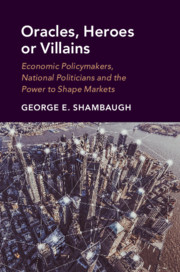
- Publisher:
- Cambridge University Press
- Online publication date:
- September 2019
- Print publication year:
- 2019
- Online ISBN:
- 9781108624978
Last updated 10th July 2024: Online ordering is currently unavailable due to technical issues. We apologise for any delays responding to customers while we resolve this. For further updates please visit our website https://www.cambridge.org/news-and-insights/technical-incident


IMF Managing Director Christine Lagarde declared central bankers and finance ministers to be the heroes of recent economic crises for taking corrective action while national politicians squabbled. What enabled them to do so? In the wake of Brexit, chaotic trade policies in the United States, and resurgent nationalism around the world, national politicians are quarrelling again, meanwhile the markets are roiling. Can we again depend on economic technocrats to save the day for these national politicians and the rest of us? What happens if they fail or, perhaps worse, go too far? In this timely book, Shambaugh answers these questions using recent economic crises in Argentina, the United States and Europe as case studies for analysing the intersections of power, politics and markets. By specifying the interactions between political uncertainty, market intervention, and investor risk, Shambaugh predicts how economic technocrats manage market behaviour by shifting expectations regarding what national politicians will do and whether their policies will be effective.
'In this fascinating tour de force taking us from Argentina to the United States and to Europe, George Schambaugh describes and analyses with the dexterity of a spy thriller novelist the 'behind the scenes' of the 'dangerous liasions' linking officials and technocrats with senior politicians in the shaping of economic policies in times of domestic and international crises. Those technocrats are actually oracles, heroes, and villains in the domestic and international scene that shapes the international political economy of the last thirty years.'
Arie M. Kacowicz - Hebrew University of Jerusalem
'Technocrats in national central banks and treasury departments often play key roles as economic policy makers in economic crises. We hear a great deal about them when they have major effects on policy, but not when they don’t. But when will they be effective? In Oracles, Heroes, or Villains Prof. Shambaugh creates what he calls a risk intervention curve that helps to answer this question. He argues that effective technocrats are far more political than their reputation suggests, and that their ability to manage risk depends on a combination of this political effectiveness and economic conditions. This book is essential reading for anyone interested in monetary and financial policy-making in times of economic crisis.'
J. Samuel Barkin - University of Massachusetts Boston
‘Well written and scrupulously researched and documented …’
M. H. Lesser Source: Choice
 Loading metrics...
Loading metrics...
* Views captured on Cambridge Core between #date#. This data will be updated every 24 hours.
Usage data cannot currently be displayed.